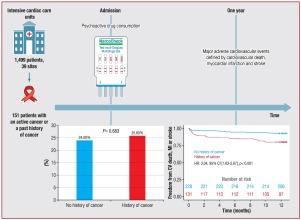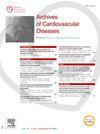癌症合并急性心血管疾病患者精神活性药物的使用与预后
IF 2.2
3区 医学
Q2 CARDIAC & CARDIOVASCULAR SYSTEMS
引用次数: 0
摘要
背景:因急性心血管事件入院的癌症患者的精神活性药物用量及短期和长期心血管预后尚不清楚。目的:评估因急性心血管事件住院的癌症患者的精神活性药物使用、住院结局和1年预后。方法:在一项前瞻性多中心研究中,所有连续入住心脏重症监护病房的患者系统地记录了癌症病史。主要终点是通过尿药物分析检测精神活性药物的流行程度。次要结局为:院内主要不良事件发生率,定义为全因死亡、心源性休克和心脏骤停;1年内主要心脑血管不良事件发生率,定义为心源性死亡、心肌梗死和脑卒中。结果:在纳入的1499例患者中,151例(10%)有癌症病史,其中61例(40%)为活动性癌症,90例(60%)为缓解期癌症。在有癌症病史的患者中,39例(25.8%)至少有一种精神活性药物检测呈阳性。采用基于患癌症可能性的匹配方法,癌症病史与院内主要不良事件风险增加无关(优势比:1.54,95%可信区间:0.68-3.45;P = 0.3)。然而,癌症病史与1年内主要不良心脑血管事件的发生率较高相关(风险比:3.04,95%可信区间:1.63-5.67;结论:因急性心血管事件住院的癌症患者中精神活性药物的使用率为25.8%。癌症病史是1年主要心脑血管不良事件的独立预测因子。本文章由计算机程序翻译,如有差异,请以英文原文为准。

Psychoactive drug use and prognosis in patients with cancer presenting with acute cardiovascular disease
Background
The psychoactive drug consumption and the short- and long-term cardiovascular prognosis of patients with cancer admitted for acute cardiovascular events are not well established.
Aims
To assess the prevalence of psychoactive drug use, in-hospital outcomes and 1-year prognosis in patients with cancer hospitalized for acute cardiovascular events.
Methods
In a prospective multicentre study of all consecutive patients admitted to intensive cardiac care units, a history of cancer was recorded systematically. The primary outcome was the prevalence of psychoactive drugs detected by urine drug assay. The secondary outcomes were: the rate of in-hospital major adverse events, defined as all-cause death, cardiogenic shock and cardiac arrest; and the 1-year rate of major adverse cardiovascular and cerebrovascular events, defined as cardiovascular death, myocardial infarction and stroke.
Results
Among 1499 patients recruited, 151 had a history of cancer (10%), including 61 (40%) with active cancer and 90 (60%) with cancer in remission. Among patients with a history of cancer, 39 (25.8%) tested positive for at least one psychoactive drug. Using a matching approach based on the likelihood of having a cancer, a history of cancer was not associated with an increased risk of in-hospital major adverse events (odds ratio: 1.54, 95% confidence interval: 0.68–3.45; P = 0.3). However, a history of cancer was associated with a higher incidence of 1-year major adverse cardiovascular and cerebrovascular events (hazard ratio: 3.04, 95% confidence interval: 1.63–5.67; P < 0.001).
Conclusions
The prevalence of psychoactive drug use among patients with a history of cancer hospitalized for acute cardiovascular events was 25.8%. A history of cancer was an independent predictor of 1-year major adverse cardiovascular and cerebrovascular events.
求助全文
通过发布文献求助,成功后即可免费获取论文全文。
去求助
来源期刊

Archives of Cardiovascular Diseases
医学-心血管系统
CiteScore
4.40
自引率
6.70%
发文量
87
审稿时长
34 days
期刊介绍:
The Journal publishes original peer-reviewed clinical and research articles, epidemiological studies, new methodological clinical approaches, review articles and editorials. Topics covered include coronary artery and valve diseases, interventional and pediatric cardiology, cardiovascular surgery, cardiomyopathy and heart failure, arrhythmias and stimulation, cardiovascular imaging, vascular medicine and hypertension, epidemiology and risk factors, and large multicenter studies. Archives of Cardiovascular Diseases also publishes abstracts of papers presented at the annual sessions of the Journées Européennes de la Société Française de Cardiologie and the guidelines edited by the French Society of Cardiology.
 求助内容:
求助内容: 应助结果提醒方式:
应助结果提醒方式:


